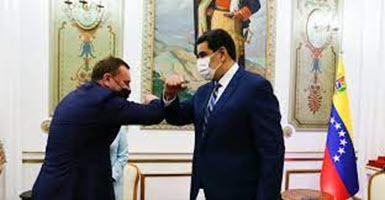Russian deputy prime minister Yuri Ivanovich Borisov led a delegation to Caracas yesterday in a sign of renewed bilateral ties.
Russia is among Venezuela’s leading international patrons and a vocal opponent of the US-led sanctions that have targeted the government of President Nicolas Maduro since 2017.
The two sides signed 12 agreements covering energy, financial, transport, military, agricultural and pharmaceutical cooperation, among other areas, under the auspices of a high-level joint committee that will meet again in Moscow in the second half of 2021, Venezuelan oil minister and committee co-president Tareck El Aissami said.
The visit “resolved almost all the pending issues and our commercial and economic relations have been renewed,” Borisov said, without detailing the outstanding issues. “We have shown our capacity to counteract sanctions and Venezuela has a stable social situation.”
Bilateral trade has grown by 4pc and “we are working to grow this further,” he added.
El Aissami said Venezuela proposed a 2021-31 “structural” agreement with Moscow to further deepen their cooperation.
Although Venezuela has been marginalized from Opec because of its diminished oil production and US sanctions, El Aissami drew attention to the production restraints of Opec+, led by Russia and Saudi Arabia.
El Aissami highlighted the “virtuous mechanism” of the Opec+ countries that seeks to “stabilize, recover and gradually and sustainably rebalance the global oil market” and open the way for post-pandemic prosperity.
Among the Russian companies that were part of the delegation was Rostec, which said it is in talks with Venezuela on applying its technology to the country’s oil industry.
Russia’s Rosneft transferred its Venezuelan oil assets to an unnamed Russian state-owned enterprise in March 2020 after the US sanctioned two of its trading arms. The company had accounted for most of Venezuelan state-owned PdV’s crude liftings in the period after US oil sanctions were imposed in January 2019. The liftings serviced PdV’s debts to Rosneft, which maintains a nominal foothold in undeveloped offshore gas blocks in eastern Venezuela. It is not clear if all of Venezuela’s debt to Russia has been paid.
The Russian visit coincides with Venezuelan government efforts to bring back private-sector investment under a new “anti-blockade” law that has so far borne little fruit.
The talks took place as Covid-19 infections surge across Venezuela. The country has received modest shipments of Russia’s Sputnik V vaccine and has authorized trials of a second Russian vaccine, EpiVacCorona.
Venezuela’s US-backed opposition blames Russia for propping up Maduro, who recently proposed using oil exports to secure more vaccine supplies. The government and the opposition recently reached a rare preliminary accord to access western vaccines through the international Covax mechanism, tapping more than $30mn in Venezuelan government funds frozen in the US.

